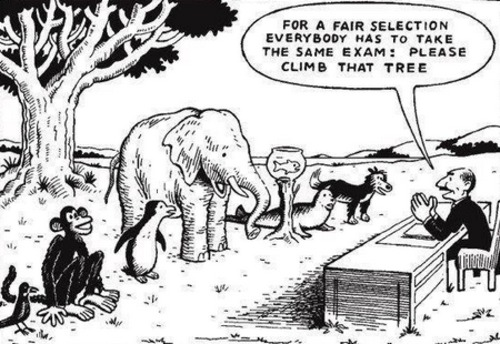Universities, colleges and employers always ask for it. For some of us, even our parents demand it. But the question is: are they demanding to reach the apex of our intelligence to give exams the best we can, or are they asking for us just to provide proof of intelligence we may or may not have?
On the one hand, with regards to A Levels and GCSEs, the design of examinations is based around various topics which reflect a particular module or unit and with regards to university, examinations are mostly based on your choice of topics you know most about.
On the other hand, where more detail is asked for, it is only asked for in one particular area or topic. This means that only your knowledge in that one area is being examined. Yes, granted that the examination structure requires students to learn topics in a great amount of detail, but I do think we all know that there is no way to tell the difference between person A who has learnt all of the topics in detail and person B who has only learnt one topic in detail.
So I pose the question, is person B who learnt only one topic with full conviction that it will appear in the examination more intelligent than person A who learnt all topics by staying up night after night and eventually achieved the same grade? Furthermore, we are all examined based on the words or numbers we write on the paper. Does that mean that person C who writes the answer 1234 after understanding and conducting careful, lengthy calculations is less intelligent than person D who guesses the answer 1234, when they both receive the same marks for a correct answer?
Something to take into account with people that succeed with exams and people that struggle with exams is that they both undergo various circumstances in their lives. Persons A, B, C and D would all gain excellent marks in their examinations, rightly or wrongly, but what if they all suffered from extreme anxiety the minute they sat down in the exam? Does this mean they are all unintelligent even though all the same knowledge was in their mind before and after the exam? Or what if only persons B and D were perfectly calm and able to perform where persons A and C completely blanked out? Does this mean that those who risk and guess are more intelligent than those who exercise their minds and ensure success?
My problem with the whole examination and grading system is that persons A, B, C and D would all get the exact same marks under ideal conditions and to me that is not how you measure somebody’s knowledge on a subject. When person E fails many exams, there is often a silent assumption that person E is not as intelligent as the rest of the class, in the same way that if persons A, B, C and D achieved the highest results, they are deemed to be more intelligent than the rest of the class.There is a quote from Albert Einstein:
“Everybody is a genius. But if you judge a fish by its ability to climb a tree it will live its whole life believing it’s stupid”.

There are many types of learners in the world but they have been categorised into three main types, which are visual, audial, and kinesthetic, where visual learners learn predominantly through what they see, audial through what their hear and kinesthetic through action. Kinesthetic learners learn best when they are moving around and their various muscles are engaged. As children they could have been deemed to be hyperactive to even be demanding attention. As Sir Ken Robinson once amusingly stated, “sometimes fidgety children are not suffering from ADHD, but they are suffering from childhood”. (https://www.youtube.com/watch?v=iG9CE55wbtY)
Some people are born with a mental strength in mathematics, others in English literature, others in science and others in the arts. I know plenty of engineering who struggle with writing long pieces which English literature students excel in. I also know plenty of English literature students who struggle with mathematical equations. The lesson learnt after reading all of this? People have different strengths in different areas. Einstein failed at mathematics, Michael Jordan wasn’t selected in his high school basketball team, Richard Branson and Steve Jobs both struggled significantly with formal education. This does not and will never mean that they are not intelligent people just because they didn’t pass every exam or just because their GPA wasn’t at a particular level.
Suli Breaks says in one of his spoken word poems: “if you remembered a fact 5 minutes after the end of the exam and that means you missed a 1st class when someone else remembered 5 minutes before the end of the exam, does that mean you’re less qualified for the job?” (https://www.youtube.com/watch?v=D-eVF_G_p-Y ) The answer is no. Never allow yourself to fall into the trap of assuming somebody is less intelligent because their grades are lower than yours, or the contrary where you assume someone is more intelligent than you because their grades are higher. The problem today is, according to Timothy Leary, “We are dealing with the best-educated generation in history. But they’ve got a brain dressed up with nowhere to go”.
If you can remain ambitious, inquisitive and humble at all times about a subject you enjoy, to me that is a far more accurate measure than any grade or written examination.
READ MORE FROM THIS AUTHOR –

